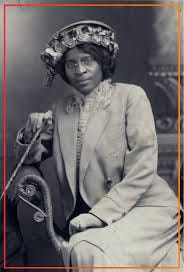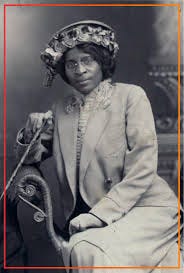Today In Black History: Dr. Charlotte Hawkins Brown
Educator, Author, and Founder of the Palmer Institute in North Carolina
Issue #836 Today In Black History, Monday, April 7, 2025
If you like us, REALLY like us, please click the “Like” button at the end of this post!
Your “Likes” mean a LOT to us! We appreciate your support!
Our April, 2025 subscriber goals are 200 new free subscribers and 100 new paid subscribers! You can help us reach our goal!
Follow Pam on Bluesky, the best “X” alternative.
Follow Keith on Bluesky, the best “X alternative.
Independent Authors and Creative Professionals: books and courses on Branding and Marketing just for you via Pam Speaks 2 You.
We appreciate your support!
Engage with us and our posts in Substack Notes, where we post almost daily.
Dr. Charlotte Hawkins Brown was a pioneering African American educator, author, and activist. Born on June 11, 1883, in Henderson, North Carolina, Ms. Brown moved to Cambridge, Massachusetts, with her family during her youth. This transition exposed her to better educational opportunities and ignited her passion for learning and teaching.
Massachusetts Board of Education member Alice Freeman Palmer paid for all of Brown's schooling expenses after they met by chance, and Palmer was taken aback by Brown's dedication.
Dr. Brown’s most significant achievement was founding the Palmer Memorial Institute in Sedalia, North Carolina, in 1902. At just 19 years old, she was invited by the American Missionary Association to open a school in the rural South. Despite challenging circumstances, including significant financial constraints and racial discrimination, Brown transformed the struggling institution into a respected preparatory school. Under her leadership, Palmer Memorial Institute became a beacon of educational excellence, nurturing the minds of thousands of Black students who made valuable contributions to society.
Dr. Brown established the Palmer Memorial Institute's board of trustees entirely of African Americans. Brown's institute served as one of the only schools in North Carolina to offer college preparatory programs.
Dr. Brown attracted national attention for her efforts, lecturing frequently at colleges nationwide and receiving several honorary degrees. In 1941, she published The Correct Thing To Do--To Say--To Wear, committing many of her educational philosophies and maxims to print. She continued to run the school until her retirement in 1952.
Dr. Brown was active in national efforts to improve opportunities for African Americans, including the Commission on Interracial Cooperation and the National Negro Business League. She was the first African American woman named to the national board of the YWCA.
The restored campus buildings of the Palmer Memorial Institute are now the Charlotte Hawkins Brown Museum, which links Brown and Palmer Memorial Institute to the larger themes of African American women, education, and social history, with an emphasis on the contributions made by African American citizens to education in North Carolina.
Dr. Brown's brother, Mingo, was the father of jazz singer Maria Hawkins Cole, who became the wife of musician Nat King Cole and the mother of singer Natalie Cole and actress Carole Cole.
Dr. Brown’s educational philosophy was revolutionary for her time. She emphasized a curriculum that balanced academics, cultural education, and vocational training. Her dedication went beyond academics; she was deeply committed to her students' social and cultural development. She believed in teaching them how to excel in scholarly pursuits and navigate and challenge the systemic barriers they faced in American society.
Dr. Charlotte Hawkins Brown died in Greensboro, North Carolina, on January 11, 1961 (aged 77).
Today In Black History
In 1837, Johnson C. Smith University was founded in Charlotte, North Carolina.
In 1940, the first U.S. stamp to honor an African American was issued bearing the likeness of Booker T. Washington.
In 1959, Lorraine Hansberry’s “A Raisin in the Sun” won the New York Drama Critics’ Circle Award for Best Play. Hansberry was the first Black person and the youngest playwright to win this award.
In 1994, the Rwandan Genocide began with the Presidential Guard killing moderate politicians and public figures, including Prime Minister Agathe Uwilinglymana.
In 2022, D.C. Appeals Judge Ketanji Brown Jackson became the first Black woman confirmed by the U.S. Senate to the Supreme Court, 53-47. After the vote, all Republican Senators except Mitt Romney (R-UT) rudely turned their backs on Judge Jackson and walked out of the chamber.
All “We Are Speaking” posts are now free for everyone to read, and commenting on our posts is now open to everyone!
Share this post:
Share this publication:
Our subscriber goals for April 2025 include 200 new free subscribers and 100 new paid subscribers. Click the link to help us reach our goals!
Our paid subscribers are encouraged to discuss this post in our W.A.S. Chat Community.
Join Pamela Hilliard Owens’s subscriber chat
Available in the Substack app and on the web
You are also welcome to view “We Are Speaking” in Substack Notes. You can also read other Substack publications without subscribing to them when you join Notes.
Did you know that you can listen to each “We Are Speaking” post and engage directly with us on the Substack App? Download the app!
Please check out Keith’s AfroFantasy Detroit Substack for posts about fantasy, sci-fi, and Afrofuturism!







My late mate’s mother attended Palmer Institute!